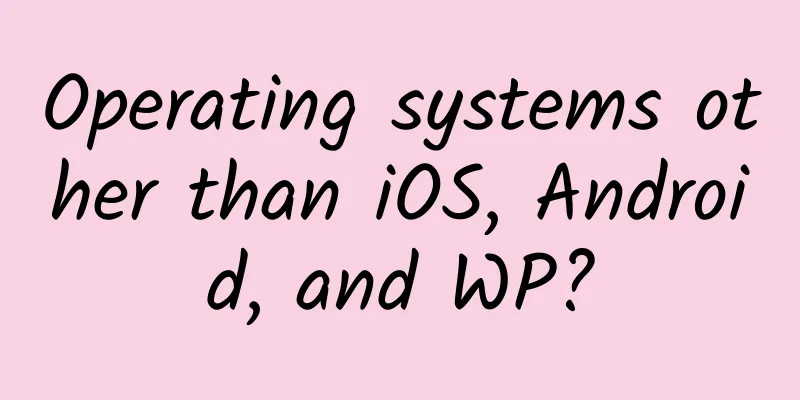Operating systems other than iOS, Android, and WP?

|
Sources revealed that Samsung will use its own operating system Tizen to make some new mobile phones. Due to the sensitivity of the news, the relevant whistleblower concealed his name. Samsung has long wanted to promote its own operating system. The choice of operating system is like the choice between red roses and white roses. Nokia, which chose Windows Phone, which was a niche product at the time, instead of Android, was eventually burned to death on the "burning platform"; and Samsung, which has become the world's largest Android phone manufacturer, increasingly feels that its initiative is being manipulated. The niche system has long been a smear of mosquito blood on the wall, and Android will eventually become a grain of rice stuck on the clothes. In fact, it is not appropriate to use Nokia as an example, because Nokia's choice of Windows Phone actually has stricter control than Google's Android. Nokia has very few things to decide freely, and only made a few compatible applications. Nokia's tragedy may just reflect that an operating system that is too strong for manufacturers in the industry chain may stifle the development of the entire industry chain. iOS is only owned by Apple. In recent years, Google has been strengthening the connection between the Android ecosystem and itself, strengthening the control over downstream manufacturers, and reducing fragmentation. For example, the Material Design specification is promoted to further strengthen the platform stickiness and prevent developers from easily "defecting". Moreover, in order to prevent the Open Handset Alliance (OHA), the hardware cornerstone of the Android camp, from splitting, Google's ban on Alibaba Cloud OS in September 2012 was also impressive. No wonder Samsung had to be sneaky when releasing the news of making Tizen phones. Until now, there are still very few machines using niche systems, and the price and configuration are not set too high. After years of development, Windows Phone is no longer the most "niche", but we still include the highest-priced WP phones. In addition to WP, the highest-priced one may be Meizu's MX4Ubuntu. Others, such as FirefoxOS, indicated their position that they would be used for low-priced mobile phones when they were launched. This also reminds us of those Nokia elderly phones that are not even 100 yuan. This is the norm for niche systems - various manufacturers have been in a state of testing the waters, and no one dares to promote them on a large scale. A few days ago, I went to the inWatch press conference. They said that they chose to cooperate with Tencent TOS because as a start-up company, developing their own system would take up a lot of manpower and be a thankless task. This is of course true, but Samsung is not inWatch after all. They not only have sufficient R&D capabilities, but also have the subjective will not to be controlled by others. If we go back two years ago, or even more than a year ago, it was considered unrealistic for mobile phone manufacturers to choose a niche system other than Android. BlackBerry had great hopes, but now it is almost falling into the Android camp. From then to now, the biggest consideration for people to choose a system is the number of native applications, and the core competitiveness lies in games. Apart from iOS and Android, there is almost no other system that can take into account the development of games. Even if most mainstream network services are provided with clients, the lack of games is still an irreparable loss. Running Webapp in the form of encapsulated web pages still encounters many practical operational problems even now. A little bit of drag and lag in details will affect people's experience. Playing games is for fun. If you don't enjoy playing for the sake of compatibility, it will be a loss. Therefore, WP and BlackBerry would rather developers "one-click porting" and make their own native applications as many as possible. As for FirefoxOS, Ubuntu and other companies that promote Webapp, it basically means giving up the high-end market. Targeting low-end machines allows users to attribute the defect of "not being able to play games" to low configuration. Of course, the technology industry cannot allow a monopoly to last forever. Even though Windows occupied more than 95% of the total operating system market share at its peak, its share has been eroded to a considerable extent today. However, the price of this erosion of market share is that the overall importance of the PC industry is declining, giving way to mobile phones and tablets. So before new devices such as wearable devices, car-mounted devices, or VR and AR come out, will the mobile phone and tablet operating systems maintain a situation where iOS, Android - at most WP - jointly monopolize? I am more optimistic. A mobile phone is a handheld display screen. The life of this device may be longer than we think. Perhaps 100 years later, we will still need a palm-sized display and computing terminal. Before mobile phones and tablets disappear, their technologies will be completely refurbished first. As 4G and even 5G networks are being rolled out, the problem that Webapp performance is not as good as native applications, which we worried about before, will be gradually solved. The solution is mainly application streaming. Just like a remote desktop, the cloud calculates the controls, engine and display effects required by a certain application, and the mobile phone is just a receiving end. After connecting to the Internet, you can open any iOS, Android or Windows Phone application in the browser. Therefore, as long as there is a browser system, it can cross the application barrier, which gives niche systems an opportunity. Before the streaming technology matures, system developers can first improve the success rate and completion of "one-click transplantation" of iOS/Android applications to their own platforms, and do a good job of mapping their own system interfaces with iOS and Android related instructions to reduce the burden on developers. Microsoft said that the programs moved from Android and iOS are "Universal apps", which can be deeply integrated with Cortana and XboxLive, and can expand the in-app shopping function and be used as dynamic tiles. In order to realize these visions, competitors including Samsung Tizen, Ubuntu, and FirefoxOS need to continuously educate users so that they are no longer so dependent on platform-specific applications and adapt to cross-platform applications as soon as possible; at the same time, the most important thing is not to give up efforts because of the current disadvantageous situation. As application developers, they should also choose between following the interface design specifications of different platforms and using a common interface across platforms. Competition is always a good thing. |
<<: Flexible design and implementation of Taobao Mobile
>>: What exactly do the cool people in conspiracy theories want to do?
Recommend
Component Library Design Guide: The Birth of a Component Library
Editor's Note: How to build a component libra...
Tianyu Cangqiong game gold-making project, claiming to have 50+ orders per day
Tianyu Cangqiong game gold-making project, claimi...
When spring comes and flowers bloom, go to the mountains, but don’t neglect ice and flood prevention!
Some time ago, when people were immersed in the b...
TSMC will continue to supply Huawei. Taiwanese media: No fear of the US
The U.S. Department of Commerce has included Hua...
WeChat for Windows upgraded to version 3.3.0: You can browse Moments and search for updates
After 7 years of waiting, WeChat for Windows can ...
"Giant panda in water" spotted again in Huairou, Beijing. This kind of jellyfish is harder to see than your luck in love!
Recently, the news that the "giant panda in ...
Detailed tutorial on how to increase followers on Douyin
Douyin has all the motivations to make people add...
Should you lie down, sit, or stand after eating? Doctors give the standard answer...
Expert of this article: Pa Lize, Chief Physician ...
Google moves AndroidX to AOSP to make development more transparent
According to foreign media reports, Google is try...
Taobao Affiliate Promotion: The Secret to Driving Traffic to Earn RMB 100,000 per Month
Traffic generation is a difficult problem for alm...
What’s new about live streaming sales?
First, the format of live streaming has become mo...
Cool Android interactive animation and visual effects: High imitation of the Yinyuetai playback page
The new version of the Yin Yue Tai APP has a very...
African children holding signs video agent, how much does it cost to produce African children holding signs video?
How to make an advertisement like “Video of Afric...
This time, it’s not just about going to the North Pole! Chinese scientists realize their dream of reaching the North Pole!
If someone has visited the North Pole and checked...
Can’t use your phone during thunderstorms? Don’t be fooled by rumors!
Produced by: Science Popularization China Produce...









